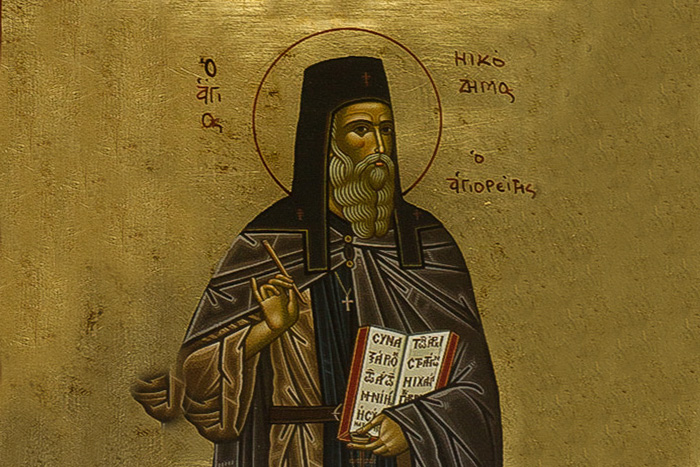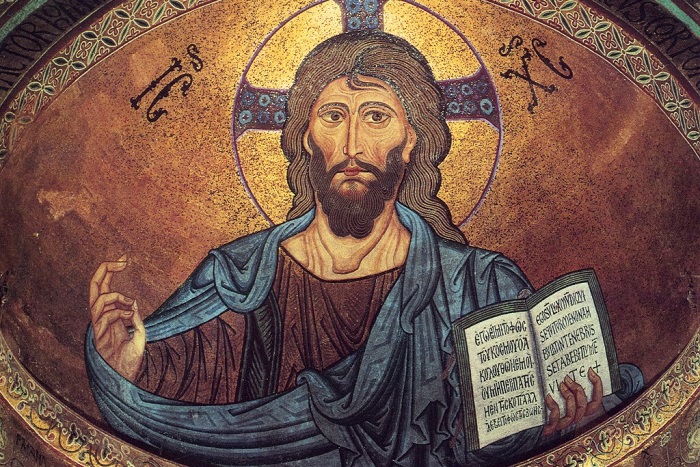
I Hear the Christmas Story and I Think of the Eucharist!
The more I hear the Christmas story, the more I’m convinced that it’s a theological argument for the Eucharist.
The Christmas story is about how the eternal Logos (Word of God) enters into creation, by means of the Holy Spirit, and takes on flesh (this action is called the Incarnation).
Through the Incarnation of Christ, humanity is transformed.
We are recreated!
We are deified.
We are saved!
The Eucharistic “story” is the same. It’s about how the Holy Spirit again enters into creation and transforms the bread and wine into the Body and Blood of Christ.
God came into our world through Christ, just as he now comes into our world through the Eucharist.
Keys Words in the Christmas Story Connect It to the Eucharist
So, you’re saying the Christmas story is also about how bread and wine become the Body and Blood of Christ? Yes!
There are a few keywords in the Christmas story that point to the Eucharist.
For example, the Savior is born in Bethlehem, which means “House of Bread.” Interesting…
After He is born, Christ is laid in a manger, which is a feeding trough, which is to say that the One born was born to have His flesh eaten and His blood drank.

The Services of the Church Also Make a Connection
The Orthodox Church’s services for Christmas are also interesting.
For example, the rule, which says that priests can only serve one Divine Liturgy in a day, is broken.
At vespers (the evening service, which marks the new day in the Orthodox calendar), we hear the birth story from St. Luke and then immediately the Eucharist is celebrated.
This is unique because the Eucharist is not typically celebrated at vespers.
Then again, the next morning the Eucharist is again celebrated immediately after the reading of the Nativity story from St. Matthew.
The Response to the Christmas Story Is a Eucharistic Celebration!
It seems as if the liturgical cycle of the Orthodox Church tells us that the appropriate response to hearing the Christmas story is to make Christ present among us (the meaning of Immanuel) by celebrating the Eucharist.
One can say that the Church is so liturgical (which is to say, “play-like”) that every Sunday becomes a Christmas play where Christ becomes Incarnate before our eyes.
When viewed in this way, the Nativity story complimented by the Eucharist is saying:
Yes, God really became man and is present among and,
yes, he’s really present now in this bread and wine, and, yes, when you partake
if it, you are united to divinity as Christ was united to humanity.
yes, he’s really present now in this bread and wine, and, yes, when you partake
if it, you are united to divinity as Christ was united to humanity.
P.S. Christmas and Eucharist Are United and They Tell the Gospel Message
The Christmas story is the story of how the uncreated God comes into creation, and it’s through this action that our fallen human nature is recreated, transformed, and saved.
The celebration of the Eucharist is the same proclamation – that God became man.
When God became man, in Jesus Christ, divinity was united to humanity. When we partake of the Eucharist, our humanity is united to divinity. Here’s what Christ said,
So Jesus said to them, “Truly, truly, I say to you, unless you eat the flesh of the Son of man and drink his blood, you have no life in you; he who eats my flesh and drinks my blood has eternal life, and I will raise him up at the last day. For my flesh is food indeed, and my blood is drink indeed. He who eats my flesh and drinks my blood abides in me, and I in
him.” (John 6:53-56 RSV)
him.” (John 6:53-56 RSV)
This is the Christmas story; this is the gospel proclamation. This is what the Orthodox Church has faithfully proclaimed since it was founded on the day of Pentecost almost 2,000 years ago.
Come this Christmas season and celebrate with the Orthodox!
By Fr. Dustin Lyon



